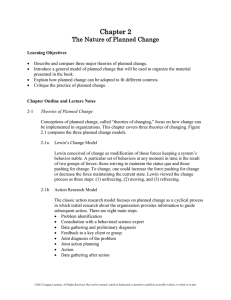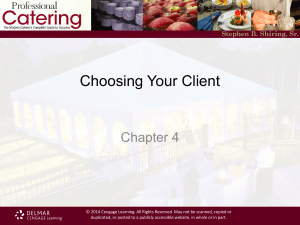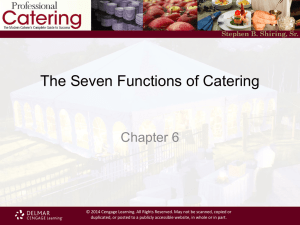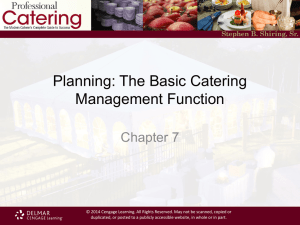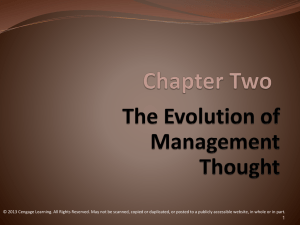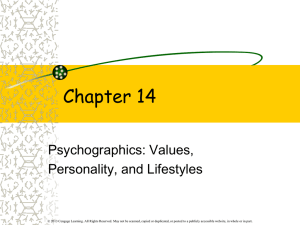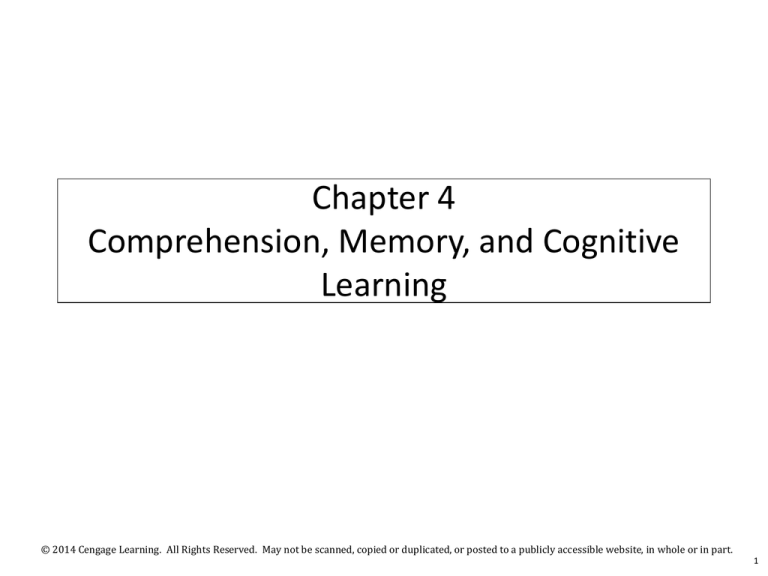
Chapter 4
Comprehension, Memory, and Cognitive
Learning
© 2014 Cengage Learning. All Rights Reserved. May not be scanned, copied or duplicated, or posted to a publicly accessible website, in whole or in part.
1
Learning Outcomes
• Identify the factors that influence consumer
comprehension
• Explain how knowledge, meaning, and value
are inseparable using the multiple stores
memory theory
• Understand how the mental associations that
consumers develop are a key to learning
© 2014 Cengage Learning. All Rights Reserved. May not be scanned, copied or duplicated, or posted to a publicly accessible website, in whole or in part.
2
Learning Objectives
• Use the concept of associative networks to
map relevant consumer knowledge
• Apply the cognitive schema concept in
understanding how consumers react to
products, brands, and marketing agents
© 2014 Cengage Learning. All Rights Reserved. May not be scanned, copied or duplicated, or posted to a publicly accessible website, in whole or in part.
Comprehension
• Refers to the interpretation or understanding
that a consumer develops about some
attended stimulus in order to assign meaning
• Internal factors within the consumer
powerfully influence the comprehension
process
• Comprehension includes both cognitive and
affective elements
• Every message sends signals
© 2014 Cengage Learning. All Rights Reserved. May not be scanned, copied or duplicated, or posted to a publicly accessible website, in whole or in part.
4
Factors Affecting Consumer
Comprehension
• Characteristics of the message
• Characteristics of the message receiver
• Characteristics of the environment
(information processing situation)
© 2014 Cengage Learning. All Rights Reserved. May not be scanned, copied or duplicated, or posted to a publicly accessible website, in whole or in part.
Characteristics of the Message
•
•
•
•
•
Physical characteristics
Simplicity–complexity
Message congruity
Figure and ground
Message source
© 2014 Cengage Learning. All Rights Reserved. May not be scanned, copied or duplicated, or posted to a publicly accessible website, in whole or in part.
Message Receiver Characteristics
•
•
•
•
•
•
•
Intelligence/ability
Prior knowledge
Involvement
Familiarity/habituation
Expectations
Physical limits
Brain dominance
© 2014 Cengage Learning. All Rights Reserved. May not be scanned, copied or duplicated, or posted to a publicly accessible website, in whole or in part.
Environmental Characteristics
• Information intensity
• Framing
– Prospect theory
– Priming
• Timing
© 2014 Cengage Learning. All Rights Reserved. May not be scanned, copied or duplicated, or posted to a publicly accessible website, in whole or in part.
Memory
• It is the psychological process by which
knowledge is recorded
© 2014 Cengage Learning. All Rights Reserved. May not be scanned, copied or duplicated, or posted to a publicly accessible website, in whole or in part.
Multiple Store Theory of Memory
• Views the memory process as utilizing three
different storage areas within the human brain
© 2014 Cengage Learning. All Rights Reserved. May not be scanned, copied or duplicated, or posted to a publicly accessible website, in whole or in part.
© 2014 Cengage Learning. All Rights Reserved. May not be scanned, copied or duplicated, or posted to a publicly accessible website, in whole or in part.
Mental Processes Assisting Learning
•
•
•
•
Repetition
Dual coding
Meaningful encoding
Chunking
© 2014 Cengage Learning. All Rights Reserved. May not be scanned, copied or duplicated, or posted to a publicly accessible website, in whole or in part.
Long-Term Memory
• Long-term memory is a repository for all
information that a person has encountered
– Represents permanent information storage
– Semantic coding - Means the stimuli are
converted to meaning that can be expressed
verbally
– A memory trace is the mental path by which some
thought becomes active
© 2014 Cengage Learning. All Rights Reserved. May not be scanned, copied or duplicated, or posted to a publicly accessible website, in whole or in part.
Long-Term Memory
• Mental tagging helps consumers to retrieve
knowledge
• Rumination refers to unintentional but
recurrent memory of long-ago events that are
not triggered by anything in the environment
– These thoughts frequently include consumption
related activities
© 2014 Cengage Learning. All Rights Reserved. May not be scanned, copied or duplicated, or posted to a publicly accessible website, in whole or in part.
Elaboration
• Refers to the extent to which one continues
processing a message even after he/she
develops an initial understanding in the
comprehension stage
• Personal elaboration - A person imagines
himself or herself associating with a stimulus
being processed
– Provides the deepest comprehension and greatest
chance of accurate recall
© 2014 Cengage Learning. All Rights Reserved. May not be scanned, copied or duplicated, or posted to a publicly accessible website, in whole or in part.
Associative Network
• It is a network of mental pathways linking
knowledge within memory
© 2014 Cengage Learning. All Rights Reserved. May not be scanned, copied or duplicated, or posted to a publicly accessible website, in whole or in part.
Declarative Knowledge
• Refers to cognitive components that represent
facts
• Represented in an associative network when
two nodes are linked by a path
– Nodes - Represent concepts in the network
– Paths - Show the association between nodes in
the network
© 2014 Cengage Learning. All Rights Reserved. May not be scanned, copied or duplicated, or posted to a publicly accessible website, in whole or in part.
Cognitive Schemas
• Schema - A type of associative network that
works as a cognitive representation of a
phenomenon that provides meaning to that
entity
• Exemplar - A concept within a schema that is
the single best representative of some
category
• Prototype - Characteristics more associated
with a concept
© 2014 Cengage Learning. All Rights Reserved. May not be scanned, copied or duplicated, or posted to a publicly accessible website, in whole or in part.
Script, Episodic Memory, and Social
Schemata
• Script - A schema representing an event
• Episodic memory - Refers to the memory for
past events, or episodes, in one’s life
• Social schema - Cognitive representation that
gives a specific type of person meaning
– Social stereotype
© 2014 Cengage Learning. All Rights Reserved. May not be scanned, copied or duplicated, or posted to a publicly accessible website, in whole or in part.



